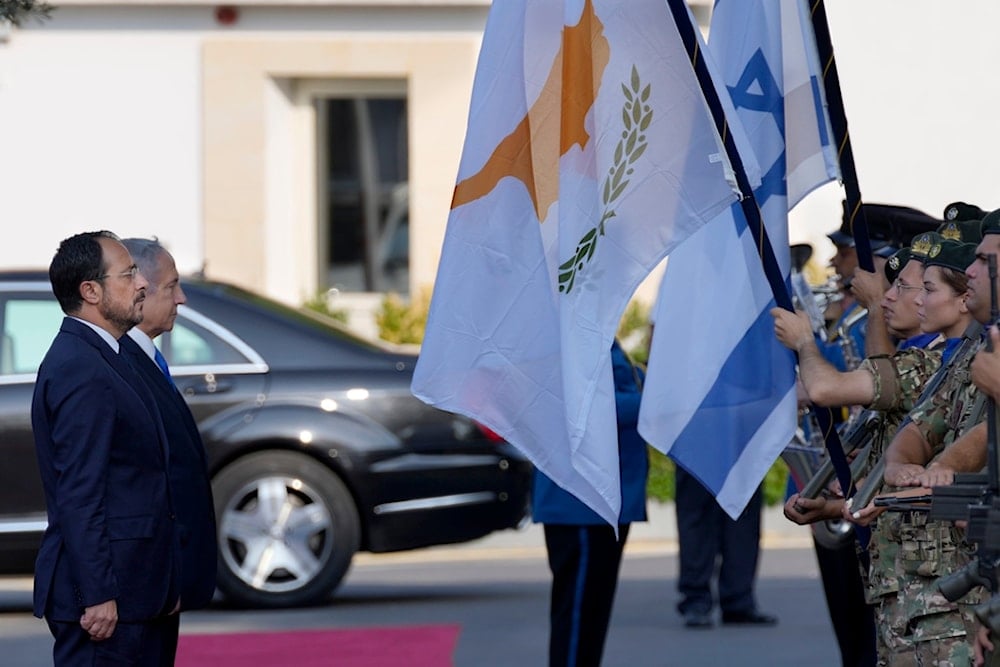Cyprus receives Israeli air defense system: Local media
The Barak MX anti-aircraft system is set to complement and eventually replace the older Russian-made Tor M1.
-

Cypriot President Nikos Christodoulides, left front, and Israeli Prime Minister Benjamin Netanyahu review a military guard of honor before their meeting at the presidential palace in the capital Nicosia, Cyprus, on Sunday, September 3, 2023 (AP)
Cyprus has received an Israeli air defense system, local media reported on Thursday, as the eastern Mediterranean island seeks to diversify its defense suppliers following the loss of Russia as a key provider, Reuters reported.
According to the TV station Sigma, initial deliveries of the system were made on Tuesday. However, Cypriot officials refrained from commenting on the details of the report.
"The only thing I can say is we will, and are doing everything necessary to bolster the deterrence force of Cyprus, not only because we are a country under occupation, but an EU member state in a region of particular geo-strategic importance," Cypriot President Nikos Christodoulides told reporters on Thursday.
Cyprus has remained divided since a Turkish offensive in 1974, triggered by a brief Greece-backed coup. The internationally recognized government controls the southern part of the island, while a breakaway Turkish Cypriot state, heavily militarized, governs the north.
The Barak MX anti-aircraft system is set to complement and eventually replace the older Russian-made Tor M1, Reuters noted.
While Russia had been a primary supplier of military hardware to Cyprus for decades, arms deals with Moscow had already been declining before a blanket ban on exports following the start of the war in Ukraine.
These sanctions have left Cyprus’ existing defense systems without spare parts and unable to undergo upgrades, a senior Cypriot source told the news agency.
"That is why Cyprus is turning to other countries of the European Union, as well as Israel. As part of that, efforts are underway to upgrade our anti-aircraft umbrella," the source added.
Due to ongoing tensions with Turkiye, Cypriot officials rarely disclose details about procurement programs.
In 1998, a Cypriot attempt to bolster its anti-aircraft defenses with Russian S-300 surface-to-air missiles led to a military standoff with Turkiye, forcing Nicosia to reroute the system to Crete.
That acquisition faced opposition from both the UK and the US at the time. However, relations between Cyprus and Washington have significantly improved in recent years, with Cyprus aligning its policies more closely with the West.
On Thursday, President Christodoulides held a phone call with US President-elect Donald Trump, during which he emphasized his commitment to deepening bilateral ties.
TRNC voices concerns over Southern Cyprus’ militarization, strategic alliances
On its part, the Turkish Republic of Northern Cyprus (TRNC) on Thursday expressed deep concern over the increasing militarization of Southern Cyprus and its facilitation of foreign forces through strategic alliances with powerful nations such as the United States.
The TRNC's Foreign Ministry warned that American backing for Southern Cyprus, presented as "strategic partnerships" and military collaborations with "Israel" and France, poses a serious threat to regional stability.
Recent media reports indicate that Southern Cyprus is pursuing the integration of "Israel's" air defense system into its military infrastructure and has initiated discussions about potential NATO membership, the Ministry stated.
It emphasized that "such attempts disregard NATO's principle of unanimous decisions for expansion and reflect Southern Cyprus' misplaced confidence bolstered by its allies."
The TRNC also criticized the European Union’s "historical mistake" of admitting Southern Cyprus as a member without resolving the longstanding Cyprus issue.
"Southern Cyprus' NATO aspirations demonstrate how emboldened they have become under the support of certain powers," the Ministry underscored.
The TRNC reiterated its opposition to Southern Cyprus' transformation into a military outpost serving external powers’ interests.
"We will continue our struggle as equal co-owners of the island," the statement declared, warning that militarization under the guise of addressing a "security threat" could have catastrophic consequences for the entire island.
The ministry concluded by urging all parties to act with restraint and called on international actors to stop enabling Southern Cyprus.
"We once again invite all stakeholders to exercise common sense and halt actions that escalate tensions," it said.
Read more: Turkey’s Fidan warns Cyprus to ‘stay away’ from 'Israel's' wars

 4 Min Read
4 Min Read








